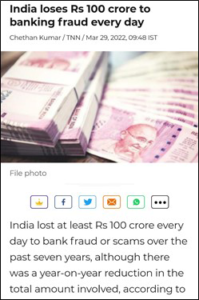
A news item in a leading newspaper on 29.2.22 must have shocked many readers. Knowing that the fraud really occurs is one thing; but knowing the magnitude is another thing!

This Rs 100 crore a day amounts to 36,500 crore in a year with virtually every Indian having an account or two in a bank; and this is for last seven years.
Shocking??
Should not be!!
Compare this with “Indian insurance companies have borne a loss of over Rs 30,000 crore in 2011 due to different kinds of frauds, a study has claimed”.
This amounted to Rs 82.19 crore daily with barely 10% population having insurance in 2011.
Note this as well:
“Insurance frauds see an increase during pandemic, says survey”. The article went on to enlighten, “Insurance frauds are typically committed at the time of applications or claims and cost a whopping ₹45,000 crore every year to insurance companies. Nearly 70 per cent of these frauds are committed through false documents”.
This amounted to Rs 123 crore daily with insurance penetration at 20-25%.
One would think that countries with clearer laws would have fewer incidences of insurance fraud. Unfortunately, this is not the case, as malicious dealings in insurance claims have become endemic to most nations. The problem is worsened by the fact that it is possible for any of the three parties – the user, the provider and the payer to be in collusion while committing insurance fraud.
So how exactly does insurance fraud happen, especially in health insurance? Looking closely at fraud cases in India, Malaysia and the UAE, it is apparent that the modus operandi of fraudsters in various countries is shockingly similar. The following are the most commonly found types of insurance fraud by users and healthcare providers:
Users:
Providers:
And why should an average citizen be concerned about insurance fraud? According to the FBI (in United States, FBI is involved in curtailing insurance fraud), non-health insurance fraud costs an estimated $40 billion per year, which increases the premiums for the average U.S. family between $400 and $700 annually.
The rising losses due to fraud raise premium for all further decelerating the already low penetration of insurance.
In India, term insurance premium has gone up 20-25% in wake of Covid related high claims/ fraud.
As revealed in a White paper by INCHES’
Applying data analytic algorithms on conclusion(s) of both concurrent and post facto clinical audit conducted on life and health claims revealed that since both, parameters for health and sickness, and the standards and rules for insurance remain the same across a nation or a continent; the methods for fraud are also common across most geographies. This in turn led to the conclusion that Universal insurance fraud allows for a universal remedial solution – a medical intelligence solution developed by combining common triggers with practicing Doctors’ medical insights.
INCHES introduced the concept of Medical Intelligence – one of the sharpest & efficient tools to contain fraud – rules based on grass root level experience of managing fraud and abuse.
INCHES’ Intelli-Claims is a path breaking, cloud-based proprietary Application, based on Standard Treatment Guidelines and customary care standards with analytics (both rule based and predictive) driven intelligent scoring to perform medical adjudication of health insurance claims in real time. A system that is updated continually and possibly an insurer specific slider that can be adjusted to come up with 75-80% STP decisions”. The rules on which scoring is based is termed “INCHES’ Gyan”.
Summarizing, The problem of insurance fraud may be both gigantic and universal, but it’s not insurmountable. Clear anti-fraud organizational philosophy, stricter and clearer laws to deal with the fraudster, along with data and knowledge-backed audits can, for sure, make a significant dent in the losses suffered by insurance companies, saving billions of rupees every year.
For more information: mail to imtiazshk@inchesgroup.com
+91 7045548825
info@inchesgroup.com
901- Harbhajan Commercial Complex, Plot No. 4954A, B, B1 to B7, Opp Petrol Pump, CST Road, Kalina, Santacruz (East) Mumbai – 400098